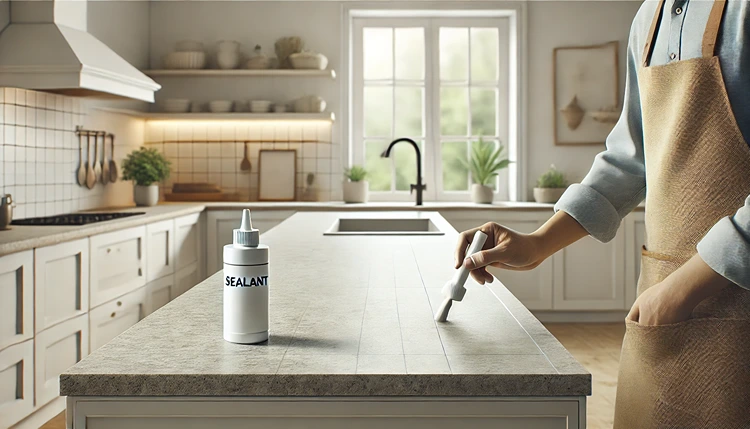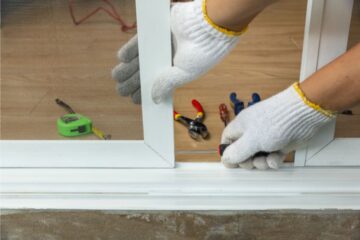How To Seal Natural Stone Countertops

Natural stone countertops add a stunning, timeless appeal to any home. However, keeping them in pristine condition requires a bit of care, especially when it comes to sealing them. Whether you have granite, marble, limestone, or slate countertops, sealing is an essential step to protect the surface from stains, moisture, and everyday wear and tear. If you’re wondering how to seal natural stone countertops effectively, you’re in the right place. In this guide, we’ll break down everything you need to know about sealing your natural stone countertops, from the types of sealants to the step-by-step process.
Why Do You Need to Seal Natural Stone Countertops?
Natural stone is porous, meaning it has tiny openings that can absorb liquids and spills, which can lead to stains, discoloration, and even long-term damage. Sealing the stone creates a protective barrier, preventing water, oils, and other substances from penetrating the surface. This not only preserves the beauty of the stone but also extends its life.
What Happens If You Don’t Seal Your Countertops?
Leaving your stone countertops unsealed can lead to permanent staining, etching, and moisture damage. Common household items like red wine, oil, and acidic liquids (such as vinegar) can easily seep into unsealed stone, leaving you with unattractive and sometimes irreversible stains.
Helpful Hint:
For high-traffic areas such as kitchen countertops, it’s recommended to reseal your natural stone surfaces at least once a year to maintain optimal protection.
How Often Should You Seal Natural Stone Countertops?
One of the most common questions homeowners have is how frequently they need to seal their countertops. The answer depends on several factors, including the type of stone, the amount of use, and the sealant applied. Generally, most natural stone countertops should be resealed annually or every two years. However, high-traffic areas like kitchens may need more frequent resealing.
How Can You Test If Your Countertop Needs Sealing?
There’s a simple test you can do to check if your stone countertop needs sealing. Drop a small amount of water on the surface and observe how the stone reacts. If the water beads up, the sealant is still doing its job. If the water soaks into the stone within a few minutes, it’s time to reseal.
Common Types of Natural Stone and Their Sealing Frequency
| Stone Type | Porosity Level | Recommended Sealing Frequency |
|---|---|---|
| Granite | Low to Medium | Every 1-3 years |
| Marble | High | Every 6-12 months |
| Limestone | Very High | Every 6 months |
| Slate | Medium | Every 1-2 years |
What Type of Sealant Should You Use?
When sealing natural stone, the type of sealant you choose is crucial. There are two main types of sealants to consider: penetrating sealants and topical sealants.
- Penetrating Sealants: These sealants absorb into the stone, creating a protective layer beneath the surface. They are ideal for porous stones like granite and marble because they allow the stone to breathe while offering excellent protection against moisture and stains.
- Topical Sealants: These sit on the surface of the stone, providing a glossy finish. While they offer some protection, they are not as durable as penetrating sealants and may wear away faster in high-use areas.
Should You Use a Water-Based or Solvent-Based Sealant?
Both water-based and solvent-based sealants are available for natural stone countertops, but they have different advantages:
- Water-Based Sealants: These are more environmentally friendly and easier to apply. However, they may not offer the same level of protection as solvent-based options.
- Solvent-Based Sealants: These provide stronger protection and are better for dense stones, but they tend to emit more fumes during application.
Helpful Hint:
If you’re concerned about indoor air quality, opt for a low-VOC, water-based penetrating sealant. It’s a safer choice for households with children or pets.
How to Seal Natural Stone Countertops: Step-by-Step Guide
Sealing your natural stone countertops is a straightforward process, but it’s essential to follow the steps carefully to ensure the best results.
1. Clean the Surface Thoroughly
Before applying any sealant, make sure your countertop is clean. Use a pH-neutral stone cleaner to remove dirt, oil, and other residues. Avoid harsh chemicals or acidic cleaners like vinegar, as these can damage the stone.
2. Let the Countertop Dry Completely
Once cleaned, allow the surface to dry for at least 24 hours. Sealing a damp countertop can trap moisture beneath the surface, leading to mildew or discoloration.
3. Apply the Sealant
Using a clean, dry cloth or a foam applicator, apply the sealant evenly across the surface. Be sure to follow the manufacturer’s instructions for the appropriate amount of sealant and application technique. Work in small sections to ensure thorough coverage.
4. Let the Sealant Soak In
Allow the sealant to penetrate the stone for the recommended time (usually 15-30 minutes). If the stone absorbs the sealant quickly, apply a second coat.
5. Wipe Off Excess Sealant
After the sealant has soaked in, use a clean cloth to wipe away any excess. Let the countertop dry completely before using it, which may take up to 48 hours, depending on the product used.
6. Test the Seal
After the sealant has cured, perform the water test again. If water beads on the surface, your countertop is well-sealed. If it soaks in, you may need to apply another coat of sealant.
Helpful Hint:
Avoid placing heavy objects or using abrasive cleaners on freshly sealed countertops, as this can damage the sealant before it has fully cured.
How to Maintain Sealed Natural Stone Countertops
Once your countertops are sealed, maintaining them is relatively simple. Here are a few tips to keep them in top condition:
- Clean up spills immediately to prevent stains.
- Use a pH-neutral cleaner specifically designed for natural stone.
- Avoid placing hot pots and pans directly on the countertop.
- Use cutting boards to prevent scratches and damage to the sealant.
How Long Does a Sealant Last?
The longevity of your sealant depends on the type of stone, the quality of the sealant, and the amount of use the countertop gets. A high-quality sealant on a granite or marble countertop can last up to five years, while countertops that get heavy use may need resealing more frequently.
Stats:
According to a survey of kitchen remodelers, 87% recommend resealing natural stone countertops annually in high-use areas like kitchens, while less frequently used areas, like bathrooms, may require sealing every two to three years.
Final Thoughts on Sealing Natural Stone Countertops
Sealing natural stone countertops is an essential part of maintaining their beauty and durability. While it may seem like an extra step in your home maintenance routine, the benefits far outweigh the effort. With the right sealant and proper care, your stone countertops can last for decades without losing their elegance. Remember, regular resealing and using the right products for daily cleaning will keep your countertops looking as good as new.
Common Mistakes to Avoid When Sealing Natural Stone Countertops
Even though sealing natural stone countertops is relatively simple, there are a few common mistakes homeowners make that can lead to less effective results or even damage to the stone. Avoid these pitfalls to ensure you get the best protection for your countertops.
Using the Wrong Sealant
Not all sealants are created equal. It’s crucial to choose a sealant that is specifically designed for natural stone. Using a generic or incorrect sealant can either fail to protect the stone or cause discoloration. Always check the label to ensure compatibility with your countertop material, whether it’s granite, marble, limestone, or another type of stone.
Skipping Surface Preparation
One of the biggest mistakes is applying sealant without properly cleaning the surface first. Dirt, oil, or grime left on the countertop will prevent the sealant from penetrating the stone evenly. As mentioned earlier, take the time to clean the surface thoroughly with a pH-neutral cleaner and allow it to dry completely before applying sealant.
Over-Applying Sealant
More isn’t always better when it comes to sealant. Applying too much can leave behind a sticky residue that’s difficult to remove. Follow the manufacturer’s guidelines closely, and wipe away excess sealant after the appropriate soak-in time.
Ignoring Resealing Schedules
Once your countertops are sealed, it can be easy to forget about them. However, over time, the sealant will wear down and your countertops will become vulnerable to stains and moisture. Mark your calendar or set a reminder to reseal them at least once a year, especially in high-use areas.
Troubleshooting Sealing Issues
If you’re experiencing issues with your sealed countertops, don’t worry. Most problems can be resolved with a little troubleshooting.
Why Is My Countertop Still Absorbing Water After Sealing?
If you notice water or other liquids are still being absorbed after sealing, it could mean that the stone didn’t absorb enough sealant. This often happens with highly porous stones, which may need multiple coats. Try applying another layer of sealant, ensuring you follow the manufacturer’s instructions.
Why Is My Countertop Sticky After Sealing?
A sticky surface is usually the result of over-applying sealant or not wiping off the excess after the sealant has had time to soak in. To fix this, use a soft cloth and a bit of mineral spirits to remove the sticky residue. Be sure to work in small sections and wipe away the solution as you go.
How Can I Remove Stains from a Sealed Countertop?
Even sealed countertops can sometimes develop stains, particularly if the sealant has started to wear away. For organic stains like coffee or wine, a mixture of baking soda and water can help lift the stain. For oil-based stains, use a paste made from baking soda and acetone. Apply the paste, let it sit for 24 hours, and then wipe it clean.
Can You Seal Countertops Yourself or Should You Hire a Professional?
Sealing natural stone countertops is a DIY-friendly task for most homeowners. With the right materials and a little bit of patience, you can achieve professional-looking results on your own. However, if you’re dealing with a particularly valuable or rare type of stone, or if you prefer the peace of mind that comes with professional work, hiring a professional is always an option.
Professional sealers have access to high-quality products and specialized tools that may offer longer-lasting protection than what’s available to DIYers. Additionally, they have the expertise to assess the condition of your stone and provide personalized recommendations for care and maintenance.
FAQs
Wrapping Up
Sealing your natural stone countertops is an essential part of maintaining their durability and appearance. By choosing the right sealant, applying it properly, and resealing as needed, you can protect your countertops from stains and damage, ensuring they last for years. Remember to clean and maintain them regularly to keep their natural beauty intact. Whether you have granite, marble, or another type of stone, proper care and sealing are key to preserving your investment.
With these tips, you can confidently seal your countertops, knowing they are protected from everyday wear and tear. By taking a few simple steps, you can enjoy the timeless elegance of natural stone while keeping it in top condition. Don’t forget to test your sealant periodically and reapply as needed, especially in high-traffic areas like the kitchen.


